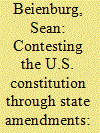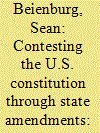| Srl | Item |
| 1 |
ID:
130959


|
|
|
|
|
| Summary/Abstract |
IN MARCH OF 2013, REPUBLICAN LEGISLATORS in North Dakota agreed to challenge Roe v. Wade by forwarding a "personhood" amendment to voters that will appear on the 2014 ballot. Such an amendment would change the state's legal definition of personhood to include unborn fetuses-a move that backers have explicitly discussed as part of a challenge to a Supreme Court decision they view as having been wrongly decided.1 The Court may pronounce itself the final arbiter of the Constitution, but Americans outside of Washington, DC do not necessarily agree.2
Such efforts by state actors to take the Constitution away from the courts mirror a recent shift in political-legal scholarship, in which court-centered accounts of constitutional interpretation and construction have been rightly condemned.3 Scholars have turned instead toward a renewed emphasis on the political contestation of non-judicial actors in enforcing the Constitution.4
|
|
|
|
|
|
|
|
|
|
|
|
|
|
|
|
| 2 |
ID:
130960


|
|
|
|
|
| Summary/Abstract |
IN MARCH OF 2013, REPUBLICAN LEGISLATORS in North Dakota agreed to challenge Roe v. Wade by forwarding a "personhood" amendment to voters that will appear on the 2014 ballot. Such an amendment would change the state's legal definition of personhood to include unborn fetuses-a move that backers have explicitly discussed as part of a challenge to a Supreme Court decision they view as having been wrongly decided.1 The Court may pronounce itself the final arbiter of the Constitution, but Americans outside of Washington, DC do not necessarily agree.2
Such efforts by state actors to take the Constitution away from the courts mirror a recent shift in political-legal scholarship, in which court-centered accounts of constitutional interpretation and construction have been rightly condemned.3 Scholars have turned instead toward a renewed emphasis on the political contestation of non-judicial actors in enforcing the Constitution
|
|
|
|
|
|
|
|
|
|
|
|
|
|
|
|
| 3 |
ID:
106081


|
|
|
| 4 |
ID:
156840


|
|
|
|
|
| Summary/Abstract |
It is widely assumed that the Supreme Court of the United States has established supremacy over contested constitutional questions, with the power to make final determinations of constitutional meaning. Since the 1960s, most scholars have assumed that legislatures and courts are engaged in a power struggle in which countermajoritarian courts can assert their will over majoritarian legislatures. More recently, a new generation of scholarship has demonstrated that judicial power often expands as a result of the willful empowerment of the judiciary by actors in other branches. Most scholars working with the latter framework, however, do not dispute that the United States has a regime of judicial supremacy—they simply see the political empowerment of courts as an explanation for why judicial supremacy has emerged despite the initially weak position of the judiciary. I argue that the insights of the political empowerment literature should be pressed further. It makes little sense to use the general label “judicial supremacy” for a system in which judicial power remains dependent on choices made by other political actors. Examining several cases that are generally seen as canonical examples of assertions of judicial supremacy, I find that courts were unable to settle constitutional debates, and in addition often either were unable to achieve their policy aims or did not actually require other political actors to do anything. The logic of new empirical findings about the sources of judicial power should compel scholars to question whether aggressive assertions of supremacy in judicial opinions are in fact accurate descriptions of how judicial power functions in the United States.
|
|
|
|
|
|
|
|
|
|
|
|
|
|
|
|